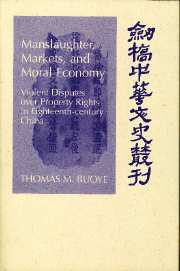 Manslaughter, Markets, and Moral Economy
Manslaughter, Markets, and Moral Economy Published online by Cambridge University Press: 28 October 2009
Contractual disputes include three major issues: redemption of conditional sales, rent defaults, and evictions. Unlike water rights and boundary disputes, in which the issues were clear-cut and the juxtaposition of plots of land determined the proximate cause of the disputes between neighbors, contractual disputes were rooted in violations of written or oral agreements between individuals who may not have known each other personally. Boundary and water-rights disputes were age-old issues, but contractual disputes reveal the dynamics of the broader changes taking place in the rural economy during the eighteenth century. Contractual disputes were more closely related to the increasing competition to define and enforce property rights in land that characterized the eighteenth century. Furthermore, these were issues that had aroused the concern and drawn the attention of provincial-level officials who commented on them in their communications to the central government. In the case of redemptions of conditional sales and rent defaults, these also were issues that prompted several amendments of substatutes to the Qing law code, leading to the criminalization of rent defaults under some circumstances and restrictions on the right of redemption.
Redemption and Other Disputes over Land Sales (56 Cases)
The overwhelming majority of the disputes in this category were related to redemptions (huishu) of conditional sales (dianmai). Redemption refers to the right of the original owner of a plot of land to buy it back at the original sale price. Conditional sales were usually made for less than the full market value of the land, and the seller often remained on the land and paid rent to the buyer.
To save this book to your Kindle, first ensure [email protected] is added to your Approved Personal Document E-mail List under your Personal Document Settings on the Manage Your Content and Devices page of your Amazon account. Then enter the ‘name’ part of your Kindle email address below. Find out more about saving to your Kindle.
Note you can select to save to either the @free.kindle.com or @kindle.com variations. ‘@free.kindle.com’ emails are free but can only be saved to your device when it is connected to wi-fi. ‘@kindle.com’ emails can be delivered even when you are not connected to wi-fi, but note that service fees apply.
Find out more about the Kindle Personal Document Service.
To save content items to your account, please confirm that you agree to abide by our usage policies. If this is the first time you use this feature, you will be asked to authorise Cambridge Core to connect with your account. Find out more about saving content to Dropbox.
To save content items to your account, please confirm that you agree to abide by our usage policies. If this is the first time you use this feature, you will be asked to authorise Cambridge Core to connect with your account. Find out more about saving content to Google Drive.